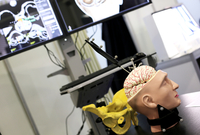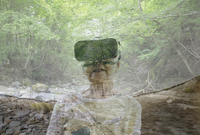LiveEOG / Project completed
Development of a multi-purpose Input Device based on the Electrooculography (EOG)
The development of a special input device, which detects and evaluates the eye movements (electrooculogram, EOG) and head movements of the wearers, is the main objective of the national cooperation project LiveEOG.
Motivation
Often there is nothing else for people with high paraplegia, bilateral amputations or progressive diseases such as muscular dystrophy, amyotrophic lateral sclerosis (ALS) or multiple sclerosis (MS) but to interact with their environment with the help of minimal head movement, movement of lips, mouth or eyes. Depending on point of time, course, duration and severity of the restriction by the above-mentioned diseases around 2.6 million people are affected in Europe. Special input devices allow the above mentioned target group to act independently with computers or their environment, and as a result provide an essential contribution to inclusion. The eye muscles and the conscious movement of the eyes can be controlled by the majority of patients. This finding immediately suggests itself to develop a computer control system based on eye movements (and deliberately triggered head movements).
Objectives
The main goal is the development and analyzes of a special input device, which detects the eye movements (Electrooculography, EOG) and head movements of the wearers. Using this input device it should be possible for people with disabilities, e.g. with high paraplegia, to use a computer or an environment control system.
In addition, the device should be used as a new input device in the field of the (computer-) game industry and for so-called augmented reality services.
In addition to the above mentioned direct opportunities for the users, this input device also enables a new method for the detection of EOG bio-signals in medical research. Especially in field tests outside of laboratory environments (e.g. studies on the micro-sleep monitoring).
Target Group/Beneficiaries
- People with disabilities
- Leisure (computer gamer)
- Science and Research
Cooperation Partner
- AIT Austrian Institute of Technology GmbH
- g.tec Guger Technologies OG
- Fachhochschule Technikum Wien
- Danklhampel
- Ernst Wittner GesellschaftmbH
- Skill3D - Events and New Media GmbH

Contact
Stefan Schürz BSc
Researcher
T +43 664 235 17 43
stefan.schuerz@lifetool.atTerm
01.09.2012 - 31.08.2014
Project Type
National Cooperation ProjectSupport Program
All projects
-

Senior.Next.Level.Mobile
-

IntegraMouse AIR
-

IMPAKT RESEARCH COMPUTER AIDED COMMUNICATION
-

RAI Dementia / Project completed
-

MEDUSA
-

VR4 Mind & Motion / Project completed
-

MEK / Project completed / Project completed
-

SALSA / Project completed
-

WheelSim VR / Project completed
-

Sharing Stories, Sharing Life / Project completed
-

MI-Tale / Project completed
-

FitDaheim – Research that makes you move / Project completed
-

Feasibility study for mouth operated control devices / Project completed
-

Fit4Speech / Project completed
-

W.I.F.I. Welding Interaction in Future Industry / Project completed
-

SOCIALCARE / Project completed
-

V(i).T.A.L / Project completed
-

MOSES / Project completed
-

IAAA / Project completed
-

Prosperity4All / Project completed
-

VRC - Voice Remote Control / Project completed
-

Touchless input systems for people with disabilities / Project completed
-

Singuage / Project completed
-

LIFEtool Educational / Project completed
-

fun.tast.tisch. / Project completed
-

MOBILE.OLD / Project completed
-

PC control via Microsoft Kinect / Project completed
-

Tablet-PC and apps / Project completed
-

SENNET / Project completed
-

Assistive Technology Laboratory (ATLab) / Project completed
-

HOMEdotOLD / Project completed
-

AsTeRICS / Project completed
-

LifeACE / Project completed
-

WheelSim – Otto Bock / Project completed
-

Myofeedback / Project completed

